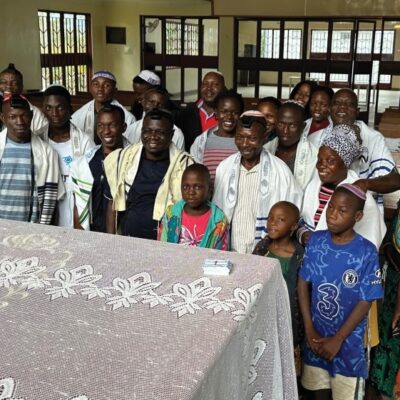Opinion
A POST-OCT. 7 WORLD
Under the surface: Addressing mixed emotions at Jewish camps this summer
Oct. 7, 2023, was my daughter Olivia’s 14th birthday. From Day One of this war, I have been learning to hold both moments of joy and grief simultaneously. To mourn and to persevere.
That evening, Olivia asked me to place the day’s events into context. We had traveled as a family to Israel five months prior. “Were we close to Gaza?” she asked with concern. Looking together at a map, I did my best to alleviate her anxiety and offer a sense of security at that moment.
As with many educators, the role of a parent takes precedence over the role of educator. Asking open-ended questions at home is often met with teenage eye-rolls and remarks acknowledging my “Israel educator” hat, so I have broached conversations about Oct. 7 by talking with her about the ensuing situations at school. She is responsive, sharing stories about the antisemitic memes certain students are sharing; she knows what it all means, and she asks questions. I tread lightly yet consistently, and she knows I’m here.
The past nine months have been a whirlwind of constant work-related travel to support educators and teens in various settings. With these communities, The iCenter educators explored how to navigate the current realities, focused on deepening nuanced relationships with Israel and Israelis, and examined the 24/7 news cycle with critical thinking. We are not just offering tools and approaches; we’re helping individuals identify their communities, develop crucial aspects of their identities and cultivate tools to navigate these challenging times.
My travels continued in early June through mid-July when I joined various summer camps across the U.S. and Canada. I found myself supporting the mishlachat, the Jewish Agency’s delegation of counselors from Israel; facilitating conversations with faculty, staff and older campers; and helping to integrate Israeli culture into the camp experience. What I encountered during all this was a complex mixture of emotions simmering just beneath the surface.

At one camp, for example, one-quarter of the staff were members of the mishlachat. Some had concluded their military service mere weeks before arriving, while others had spent the past year embedded in a community abroad. At several camps, a makeshift memorial was created in the staff lounge: flags on the wall, names of those lost (with names added weekly), and photos and stories of personal friends displayed between battery-operated Yizkor candles. For the staff who bore witness, these intimate tributes humanized a conflict that can feel distant, both geographically and emotionally, amid the constant noise of social media.
Over the course of my time at each camp, I worked to establish trust with both the North American and the Israeli staff. I made a concerted effort to converse with the Israeli mishlachat in Hebrew when appropriate, fostering a deeper connection through shared language. By the end of the week, when I offered a space for the Israeli staff to gather and share, the impact was profound. Many expressed feelings of guilt for being away from Israel during the summer, but also pride in their work at camp. They spoke of the difficulty in transitioning between feelings of pain and grief to moments of joy and normalcy. “If something good happens here at camp, I forget for a minute. And then I cry,” one Israeli staff member shared. They discussed the disconnect between media portrayals of Israel and the realities on the ground.
The campers, too, carry hidden burdens, borne of the antisemitism they have heard about or experienced firsthand in their schools and communities over the past nine months. At camp, they seek solace and connection with their Jewish community.
In one camp, close to the end of the session, I had the opportunity to gather the older campers to explore their lingering concerns. Their questions are heartbreakingly universal right now: Why do so many people hate Jews right now? How should they confront friends sharing offensive memes? What strategies can help when friendships end due to differing perspectives? What is daily life in Israel really like?
I addressed each question as if speaking with my own child, and encouraged the participants and staff to share personal stories when comfortable. This relational approach helped campers contextualize the headlines they’ve been bombarded with.
The interplay of joy and sorrow was evident in unexpected moments. During Shabbat services at one camp, the transition from the solemn Mourner’s Kaddish to celebratory singing and dancing proved jarring for many Israeli staff. A deliberate moment to acknowledge this challenging transition helped. When my daughter Olivia returned from her own camp, she shared a video of campers and staff dressed in black with yellow ribbons dancing to Israel’s Eurovision entry, “Hurricane.”
I also witnessed countless moments of genuine connection and unity. Campers and staff bridged cultural divides through shared experiences. Many Israeli staff expressed gratitude for the support system they’ve found among their peers at camp. Olivia recounted a conversation with a returning mishlachat member about her service in miluim (reserve duty) and daily life in Israel today. This information personified the value of perseverance and made the complexities of the past nine months a little less shrouded in mystery.
As I balance my roles as dad and educator, I must recognize the depth of emotion they each carry. By creating safe spaces for vulnerability, encouraging personal storytelling and embracing both the highs and lows together, we can help our community move forward. The pain may linger under the surface, but so too does the strength of our connections.
Dan Tatar is the director of engagement and strategic partnerships for The iCenter. With a deep passion for Israel education, Tatar led the Israel track at this year’s Cornerstone seminar through the Foundation for Jewish Camp. This summer he is spearheading The iCenter’s summer camp efforts, leading visits and support to nearly three dozen day and overnight camps across North America.













